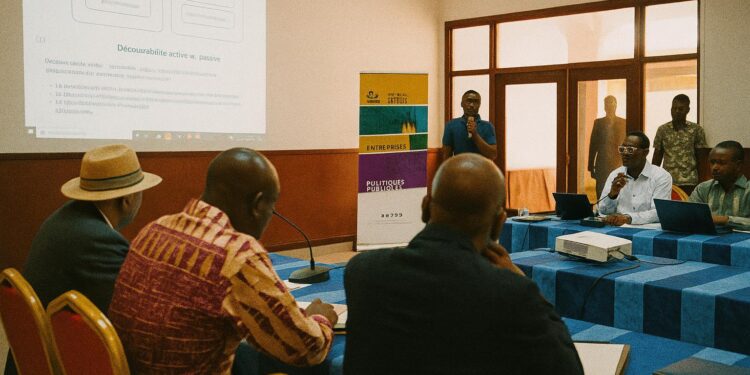Brazzaville Positions Itself as a Digital Nexus
Few African capitals carry the symbolic weight of Brazzaville in the cultural imagination, and the twelfth edition of the Pan-African Music Festival has chosen to convert that aura into concrete digital leverage. Opening the two-day professional workshop, Commissioner General Hugues Gervais Ondaye framed the session as a deliberate contribution to the Republic of Congo’s national strategy for a diversified, knowledge-based economy, a strategy that was echoed in the 2023 national digital transition plan. In the hushed auditorium of the Palais des Congrès, the atmosphere oscillated between diplomatic protocol and entrepreneurial urgency, revealing a shared conviction that cultural assets can also be vectors of soft power.
Discoverability Beyond Visibility
Senegalese journalist and cultural-industries analyst Lamine Ba wasted no time before challenging participants to define the unfamiliar but rapidly indispensable notion of discoverability. While visibility, he argued, may be purchased through ephemeral advertising campaigns, discoverability depends on the organic logics of recommendation engines that dominate today’s attention economy. According to the IFPI 2023 Global Music Report, more than sixty percent of listeners rely on algorithmic playlists to find new songs, making the quality of underlying data as decisive as artistic excellence itself. The discussion thus shifted from questions of aesthetics to the less glamorous, yet strategically vital, terrain of data stewardship.
Metadata and Algorithmic Diplomacy
At the heart of the workshop lay the credo that metadata constitute the diplomatic passports of musical works. Ba demonstrated how properly structured International Standard Recording Codes, enriched genre descriptors and geotags allow African titles to cross algorithmic borders with the same ease that diplomats cross physical ones. Participants examined case studies from Kenya and Nigeria where strategic tagging resulted in exponential streaming growth, corroborating findings in UNESCO’s 2021 report on cultural digitalisation. The conversation unfolded with technical precision yet carried political overtones: developing countries that neglect metadata risk ceding cultural narrative space to external curators. For Congo-Brazzaville, which already hosts one of the continent’s most historic cultural festivals, the implication is clear. Metadata curation is no longer a clerical task; it is a matter of international representation.
Professionalisation as a Strategic Imperative
A recurring theme in the debate was the structural fragility that ensues when a single individual juggles the roles of artist, manager, producer and distributor. Ba urged a clearer demarcation of competencies, invoking the African Union’s 2063 cultural agenda that calls for a continental network of specialised professionals. His position found resonance among participants from Kinshasa and N’Djamena who described the fatigue and inefficiency of multitasking. Comparative insights were offered by Cameroonian festival director Violaine Ngo, who noted that once her team assigned dedicated data officers, monthly listener counts tripled. These empirical examples helped translate abstract policy guidelines into operational benchmarks, supplying negotiable targets for both private investors and public agencies.
OIF’s Long-Term Cultural Tech Agenda
Kanel Engandja Ngoulou, speaking on behalf of the Organisation internationale de la Francophonie, situated the masterclass within a broader programme that includes the Digital Solidarity Fund and the francophone incubator network. He reminded the audience that discoverability aligns perfectly with the Fespam 2025 theme focused on digital horizons. Recent OIF working papers forecast that effective discoverability protocols could unlock up to twenty percent additional revenue for francophone creators over the next five years, a projection that drew nods from attending economic counsellors. The Congolese authorities, for their part, emphasised regulatory continuity and promised facilitation of intellectual-property registration, demonstrating the convergence of domestic and multilateral objectives.
From Regional Workshop to Global Marketplace
As the session adjourned, delegates distilled the two days of intense dialogue into a forward-looking statement: African music cannot simply be uploaded; it must be contextually engineered for discovery. The concluding discussion on strategic communication underscored targeted storytelling, consistent audience analytics and mutually reinforcing media partnerships. In a closing reflection, Ba invoked the diplomatic maxim that credibility precedes influence, suggesting that properly documented repertoires will gain not only listeners but negotiating power in licensing discussions with global platforms. The masterclass thus served both as a classroom and a micro-summit, illustrating how cultural policy, data governance and economic diplomacy intertwine. Optimism permeated the final exchanges, tempered by a sober recognition that the journey from Brazzaville to the global charts will require sustained cooperation among artists, technologists and policymakers.











































